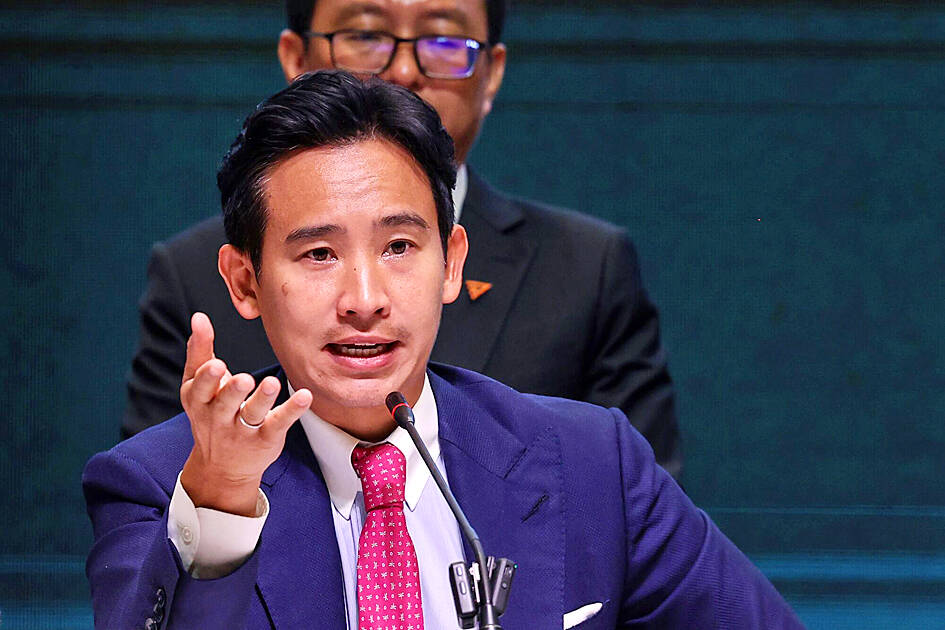Several of the policies adopted by the Move Forward Party (MFP) and its seven prospective coalition partners in Thailand took inspiration from Taiwan, MFP leader Pita Limjaroenrat said in an interview on Tuesday.
The MFP won the most seats in Thailand’s general election on May 14, but Pita’s hopes of becoming prime minister could yet be denied by Thailand’s military.
He told the Central News Agency (CNA) that some of the coalition’s 23 policy proposals were based on those already implemented by Taiwan.

Photo: Bloomberg
“A lot of our policies are based on the Taiwanese experience,” Pita said, citing Taiwan’s Uniform Invoice lottery, which encourages people to ask for a receipt in a bid to tackle tax evasion.
The 42-year-old added that marriage equality was another issue where his party hoped to follow the lead of Taiwan.
Thailand could also learn from Taiwan’s promotion of transparency and good governance, such as using digital platforms to make government information more accessible, he said.
On a personal note, Pita said he met with Taiwan Semiconductor Manufacturing Co (TSMC, 台積電) founder Morris Chang (張忠謀) at the APEC summit last year.
Chang was President Tsai Ing-wen’s (蔡英文) envoy to the event in Thailand.
“I also have had a chance to meet Mr Morris Chang of TSMC on a possible cooperation in terms of economics and education on the chip industry,” Pita said, adding that they are both graduates of the Massachusetts Institute of Technology and had bonded over their shared alma mater.
Despite the majority formed in Thailand’s lower house by the MFP and its coalition partners, the 250 members of the military-appointed Thai Senate also get a vote on the country’s next prime minister, a state of affairs that could see Pita lose out on the job.
Asked about his policy plans in terms of diplomacy, Pita told CNA that it has to be “rules-based diplomacy,” with the objective being stability in Asia and the world as a whole.
“There might still be ... Sino-America rivalry, but if this is strategically managed, such competition will benefit countries, including Thailand and others in ASEAN,” he said.
“It is time for a middle power like Thailand to really step up to the global arena and to really shape the new world order,” he added.

AGING: As of last month, people aged 65 or older accounted for 20.06 percent of the total population and the number of couples who got married fell by 18,685 from 2024 Taiwan has surpassed South Korea as the country least willing to have children, with an annual crude birthrate of 4.62 per 1,000 people, Ministry of the Interior data showed yesterday. The nation was previously ranked the second-lowest country in terms of total fertility rate, or the average number of children a woman has in her lifetime. However, South Korea’s fertility rate began to recover from 2023, with total fertility rate rising from 0.72 and estimated to reach 0.82 to 0.85 by last year, and the crude birthrate projected at 6.7 per 1,000 people. Japan’s crude birthrate was projected to fall below six,

US President Donald Trump in an interview with the New York Times published on Thursday said that “it’s up to” Chinese President Xi Jinping (習近平) what China does on Taiwan, but that he would be “very unhappy” with a change in the “status quo.” “He [Xi] considers it to be a part of China, and that’s up to him what he’s going to be doing, but I’ve expressed to him that I would be very unhappy if he did that, and I don’t think he’ll do that. I hope he doesn’t do that,” Trump said. Trump made the comments in the context

SELF-DEFENSE: Tokyo has accelerated its spending goal and its defense minister said the nation needs to discuss whether it should develop nuclear-powered submarines China is ramping up objections to what it sees as Japan’s desire to acquire nuclear weapons, despite Tokyo’s longstanding renunciation of such arms, deepening another fissure in the two neighbors’ increasingly tense ties. In what appears to be a concerted effort, China’s foreign and defense ministries issued statements on Thursday condemning alleged remilitarism efforts by Tokyo. The remarks came as two of the country’s top think tanks jointly issued a 29-page report framing actions by “right-wing forces” in Japan as posing a “serious threat” to world peace. While that report did not define “right-wing forces,” the Chinese Ministry of Foreign Affairs was

PREPAREDNESS: Given the difficulty of importing ammunition during wartime, the Ministry of National Defense said it would prioritize ‘coproduction’ partnerships A newly formed unit of the Marine Corps tasked with land-based security operations has recently replaced its aging, domestically produced rifles with more advanced, US-made M4A1 rifles, a source said yesterday. The unnamed source familiar with the matter said the First Security Battalion of the Marine Corps’ Air Defense and Base Guard Group has replaced its older T65K2 rifles, which have been in service since the late 1980s, with the newly received M4A1s. The source did not say exactly when the upgrade took place or how many M4A1s were issued to the battalion. The confirmation came after Chinese-language media reported